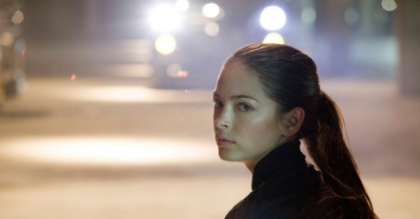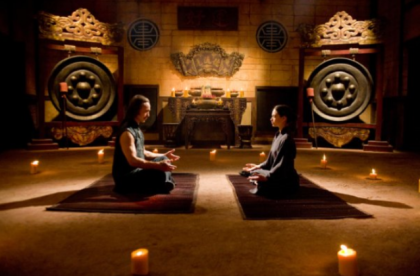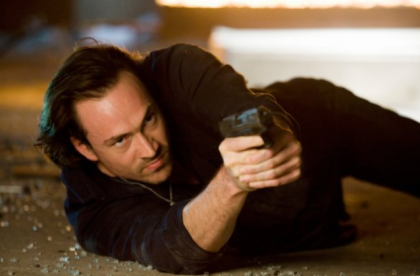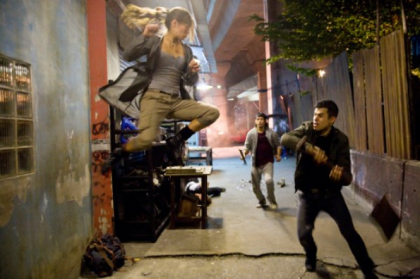The first Street Fighter live-action film was an absurd parody. Jean-Claude Van Damme was barely able to express himself clearly, the costumes looked like they were bought at a Ricky’s costume outlet for $50, I don’t think there actually was a script, and the martial arts were…well, definitely not art.
Going to see video game films is an iffy prospect, because anyone who has been paying attention knows its probably $10 and 2 hours you’re never getting back, but if you’re a gamer, you’re waiting for the video game film that will justify to everyone what you’ve been saying about video games for years.
Street Fighter: the Legend of Chun-Li is not the film you’ve been waiting for. It’s better than its predecessor, but that’s not saying much. It doesn’t stand well on its own, and in many places it’s simply not enjoyable to watch. That said, this is probably the most serious attempt I have ever seen to make a workable movie out of a videogame.
In the games, Chun-Li, the token female heroine of the Street Fighter universe is a decorated Interpol agent, hot on the heels of the Shadowloo criminal organization, whose leader, M. Bison, brutally murdered her father, a Hong-Kong cop, when he got too close. It’s a scenario we’ve all seen before, a nice solid police-revenge storyline. Throw in some martial arts, and you’ve got the roots of what could be a decent homage to Hong-Kong cinema, and a good video game movie to boot. Well, that didn’t happen, though I can give them bonus points for effort.
Kristin Kreuk plays Chun-Li, whose life’s goals are to learn martial arts from her businessman father and become a concert pianist. Even though it’s apparently her big dream, once the setup is over, you never hear about it again. Also, if like Kristin Kreuk (and myself) you have an Asian parent or two, you’re probably just asking “she just had to be a concert pianist?”

In the very beginning of the film, in what’s unfortunately also the best fight scene in the entire film, Chun-Li’s father is kidnapped by the villainous M. Bison. M. Bison is the personification of evil in the Street Fighter universe and played by Neal McDonough. He is supported in his evil efforts by key Street Fighter evil sidekicks, Balrog and Vega, played, respectively, by Michael Clarke Duncan and Taboo from the Black Eyed Peas. Fast-forward ten years, and Chun-Li is now an accomplished concert pianist. For plot reasons that really don’t make any sense, she gives up her career and goes to live in the Thailand slums, looking for secret kung-fu master Gen, played by Robert Shou (who for the real game-movie geeks, also played Liu Kang in Mortal Kombat).

Gen has pushed her on this path, because, for equally nonsensical plot-reasons, Chun-Li is somehow the key to being able to bring down Bison, whose evil world-dominating plan is to buy the slums of Bangkok so he can bull-doze them and replace them with high-rent luxury housing.
Seriously, that’s Bison’s evil plan. For world domination.
Chris Klein plays Charlie Nash, figure of Street Fighter legend and owner of a peculiar, greased-back, receding-hairline ‘do that dominates his every scene. Moon Bloodgood plays his partner, and does nothing.
Despite how it already sounds, I have to give credit to the filmmakers for a few things done right:
(1) The filmmakers clearly wanted to get as far away from the original live-action film as possible. There are relatively few throw-away references to the game (with a few brief, but notable, exceptions), no iconic costumes (aside from Vega’s), and Kristin Kreuk is clearly trying to make the audience see Chun-Li as a real, relatable character beyond her video game persona (and she nearly succeeds). The desire to show some restraint and not distract from the actual film is a quality that has mostly been completely lacking in video game films. Previous films often went for as many throw-away references as possible, no matter how clumsy, because they think fans will appreciate them, and its one of the primary failings of the genre.
(2) The actual “street fighting” is also pretty good. Developed by choreographer Dion Lam (whose work includes Spider-Man 2 and the Matrix films), the fights in this movie are fast and the hits are palpable. Some of the moves, particularly Chun-Li’s, are down-right painful to watch: there is a clear understanding that a martial artist as small as Kristin Kreuk is going to go for the quick disable rather then slugging it out. Fans of rougher fare, like the Bourne films, or anything with Chow Yun-Fat or Tony Jaa in it, might find the scenes decent but otherwise a bit ho-hum, but certainly a step up from the first Street Fighter or the Mortal Kombat films.
What really brings the film down is essentially everything else. The pacing of the film is so slow that there’s practically no tension in any of the scenes, and the dialogue is actually less interesting then the ridiculous catch-phrases from the game.
The largest problem is that neither Neal McDonough or Chris Klein are able to hold their parts of the film. In the games, M. Bison is the despotic, maniacal, literally soul-crushing tyrant of a southeast Asian nation built upon international crime. In this film, he’s a kind of sleazy gangster who, except for a slightly disturbing flashback scene about his origins, restricts his time to shady real estate deals and off-screen murders. An actor with enough maniacal charisma could have pulled it off (maybe), but Neal McDonough doesn’t bother to display that kind of energy.

To quote Mike Myers, he’s the “Diet Coke of evil,” and it doesn’t help that thanks to Chris Klein’s hair, Bison’s not the most terrifying, or even slimy, thing in the film.

Hair aside, Chris Klein’s character spotlights the most egregious plot failure of the film. Having changed Chun-Li’s background so that she is no longer an Interpol agent, the film makers decide to awkwardly introduce Chris Klein’s character, an Interpol agent who is loosely based off another Street Fighter character, to verbally explain in the beginning why Bison is a bad guy, and who then literally sits around doing nothing for most of the rest of the film until the action-packed climax. The film is already fairly short, maybe 1h45m, but the setup for Chun-Li’s new backstory and Chris Klein’s character is at least 15-20 minutes of screen time plot-hashing that is completely unnecessary.
I think the filmmakers tried very hard to create a respectful, character-driven film about one of Street Fighter‘s most popular characters. Kristin Kreuk is fairly decent in her role, and its fun to watch her kick some ass, but the rest of the film is simply not interesting and is often paced very lethargically. If you’re looking for a martial-arts/fighting movie with a silly plot, you’d be better off seeing if Taken is still in theaters, or judging from a trailer that showed just before this film, waiting for Fighting, starring Channing Tatum and Terrence Howard, which, ironically, appears to actually be about a street fighter.










